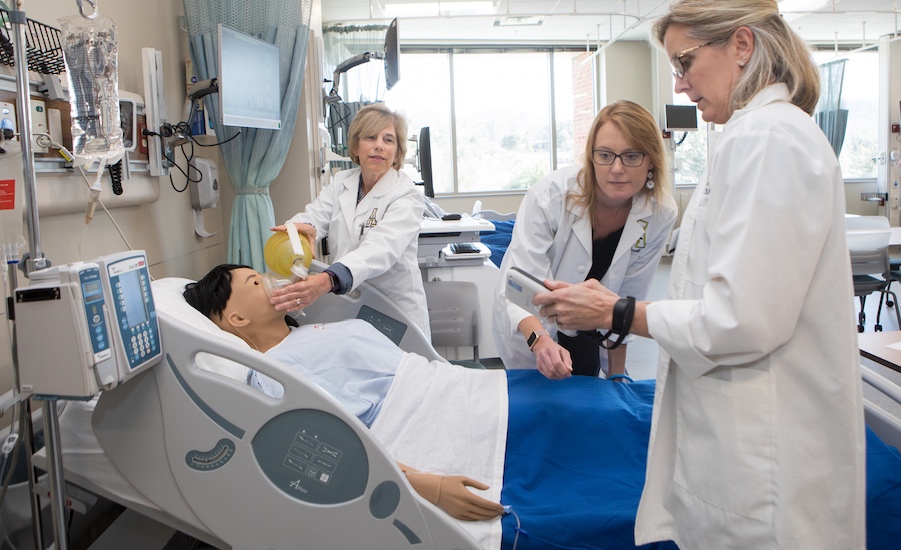Healthcare Simulation Coordinators oversee the daily operation of simulation laboratories/centers. Previously we have shared job descriptions for Entry Level Sim Techs, and Experienced Senior Level Sim Techs, and today Dr. Kim Baily covers the responsibilities of all things Coordinator! Today’s article was guest authored by Kim Baily PhD, MSN, RN, CNE, previous Simulation Coordinator for Los Angeles Harbor College and Director of Nursing for El Camino College. Over the past 16 years Kim has developed and implemented several college simulation programs and previously chaired the Southern California Simulation Collaborative. The exact responsibilities of the Coordinator role varies tremendously depending on the size of the simulation laboratory, the goals of the learning institution and the budget available. When writing a job description for your institution, consider the following aspects of the simulation coordinator position, with the job description linked below!
Funding
Will position be part time or full time and what benefits will be offered? Many smaller colleges and medical facilities have limited budgets and may only be able to offer part time positions or will need to combine a simulation coordinator position with another role. Bare in mind that part time sim coordinators may be looking for full time work so if possible offer a full time position with benefits.
Department Budget, Equipment and Supply Management
Simulation coordinators may have to supervise the simulation laboratory budget and report the budget to a manager, director or dean depending on the individual lab. Simulation in Healthcare Coordinators often manage equipment and supply inventories and make recommendations for the purchase of new equipment. They may have to complete an annual inventory as well as schedule routine maintenance of equipment, oversee software updates, facilitate repairs and plan for service contracts with vendors.
Administration versus Faculty versus Management
Some institutions consider the clinical simulation coordinator as an administrative role with no teaching responsibility. The administration position may be paid less money than a designated manager position or faculty position. Accreditation bodies may require different educational qualifications for any position that involves teaching. Bare in mind that once a simulation coordinator has an educational role with direct student contact, their position may be counted into the part-time or full time teaching staff which in turn can affect the full time to part time faculty ratios.
Size of Simulation Facility
In a large sim lab facility with multiple rooms, functions and users, a simulation coordinator becomes a must. The simulation center may be made available to several different departments each of which have their own faculty and administrators.The coordinator can liaise with the different departments and will be the main point of contact. In addition, coordinators often supervise various technical staff who set up, operate and tear down simulation scenarios as well as plan for moulage, prepare simulation medications and manage electronic health records. Coordinators need to have excellent communication and organizational skills
Simulation Center Activities
In addition to simulation labs, many larger centers have Standardized Patients, virtual reality labs, skills labs, interdisciplinary simulations and conferences/meetings. The simulation coordinator functions as a scheduler for all the activities of the center.
DOWNLOAD THE COORDINATOR JOB DESCRIPTION HERE!
Outside Users
Some centers offer their labs to outside users. In this case, Simulation Coordinators often manage contracts, security, and insurance.
And Sometimes – We Wear Many Hats!
In smaller simulation laboratories with limited funding, a single faculty member may be responsible for many of the responsibilities described above as well as set up, run and debrief each scenario. They are coordinator, manager, educator and technician!
The attached template includes many options for a simulation coordinator position. Some will not be relevant to your institution and should be deleted. If the position includes an educational role, additional requirements may be needed such as state licenses and relevant clinical experiences. In any case, managers and deans should be made aware of just what is involved in planning and operating a simulation lab so that they can factor sufficient funds into their budget for a simulation coordinator position!
Additional Reading: INACSL Standards of Best Practice – Simulation Operations
Personnel and financial resources are also an integral part of SBE programs. The largest barriers to growth in simulation centers worldwide is lack of financial support and technical (operations) staff. The National Council of State Boards of Nursing study found that dedicated, trained simulation personnel are necessary to ensure consistent and reproducible SBE outcomes. With formal simulation education beginning to materialize, it is necessary to recognize formal simulation education and training as the preferred requirement for hire; however, personnel with on-the-job training and relevant prior experience can be substituted when competency and proficiency can be demonstrated.
The SBE program must also budget for, and use, appropriate fidelity, space, equipment, resources, and the expertise necessary to operate and meet all facets of the program. The SBE budget and human resource requirements must foster and support expertise and professional development of SBE personnel. Proficiency, competency, and expertise in pedagogy leads to improved outcomes in the regional and/or global delivery of health care. Well-designed SBE programs require a large investment of money, resources and time, often with limited capacity to yield equal immediate monetary return on investment. Ultimately, the goal is improved competency metrics among novice learners, clinicians transitioning to practice, licensed clinicians engaging in continuing education, and a positive effect on patient outcomes. Read the full INACSL Operations Standard here!
Visit Our Medical Simulation Jobs Page for More Great Resources!
Have a story to share with the global healthcare simulation community? Submit your simulation news and resources here!








